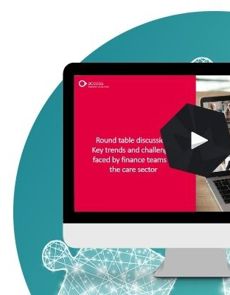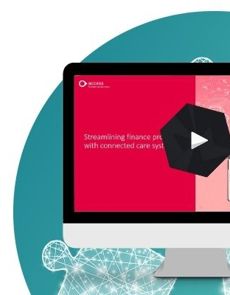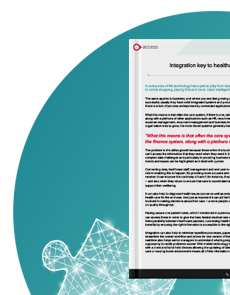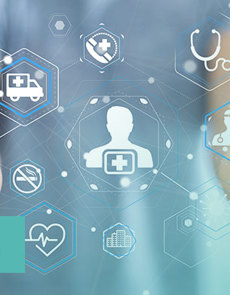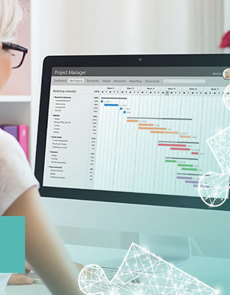Integration: key to healthcare growth
In every area of life, technology has a part to play from keeping in touch with friends and family to online shopping, paying bills and more. Used intelligently, it can make our lives easier.
The same applies to business, and where you see fast growing organisations that are incredibly successful, usually they have solid integrated systems and processes in place. Organisations suffer where there is a lack of process underpinned by connected applications.
What this means is that often the care system, if there is one, sits separately from the finance system, along with a plethora of other applications such as HR, recruitment, home purchase management, expense management, document management and business intelligence. And the bigger the organisation tries to grow, the more siloed systems generally become.
What this means is that often the care system sits separately from the finance system, along with a plethora of other applications.
The problem is this stifles growth because those within the business aren’t working as efficiently, they can’t access the information that they need when they need it. It becomes difficult to manage these complex data challenges and particularly in providing business intelligence to management, so that trends and issues can be highlighted and dealt with quicker.
Connecting data, healthcare staff, management and end user is critical and technology plays a central role in enabling this to happen. By providing more accurate and complete information about the care receiver it can improve the continuity of care if, for instance, they’re taken into hospital – and also when they return to ensure that care is coordinated and enables a care plan to be devised to support their wellbeing.
It can also help to diagnose health issues sooner as well as reduce errors. In effect it can offer safer health care for the end user. And just as important it can aid family and the care receiver by being involved in making decisions about their care – a more people centred approach, and one that focuses on quality throughout.
Having secure one patient notes, which I mentioned in a previous article, means that all healthcare staff can access these in order to give the best, fastest medical care and attention. When technology facilitates interoperability between healthcare partners, connecting healthcare environments, this brings massive benefits by ensuring the right information is accessible to the right people at the right time.
Integration can also help to minimise repetitive processes, paperwork and spreadsheets, helping to streamline the overall workflow and allows for one version of the truth. Being able to monitor activity in real-time also helps senior managers to understand what’s going on in the business and provides an opportunity to rectify problems sooner.
With mobile technology being able to book shifts, register a call with a client and hand held devices allowing the updating of client information as they attend to them in a care or nursing home environment means all of this information is readily available and stored centrally.
This valuable data when analysed can bring greater insight into what is happening within the organisation. It can highlight where there are problems as well as what is working well. However, speed is of the essence because if you only see the data weeks after it has been collated then you’re going to be reacting to information that is out of-date and possibly it will be too late to take corrective action.
Being able to monitor activity in real-time helps senior managers to understand what’s going on in the business.
By allowing applications to talk to each other it aids the healthcare provider in adhering to regulatory requirements as well as planning its trajectory within a more competitive business environment. And not forgetting that integration is key when looking to expand the healthcare business in a scalable fashion with every area of the business working on the same system.
At the end of the day, technology is an enabler but people also have an important part to play in the success of how it is utilised too. It takes both to truly make it work - but get the balance right and the benefits can be tremendous.

The importance of integrated data in the care world
Explore resources
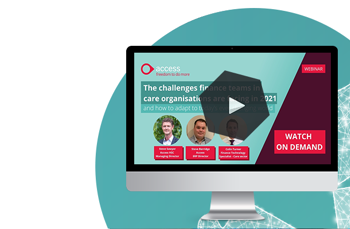
The challenges faced by finance teams in care organisations
Get an insight into the world of health and social care and discuss key challenges care organisations are facing and how to solve them with the right technology.

Get your guide to finance transformation in the care sector
Why digital transformation is necessary for care providers.
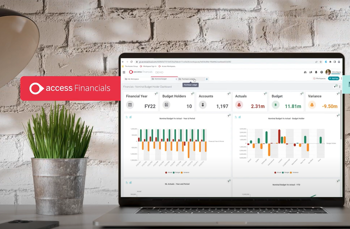
Increase revenue and reduce costs with an integrated management platform
How an integrated financial and care platform can give you a single version of the truth enabling better compliance, reduced costs and increased profitability.
Explore further
Discover more resources on finance automation and integration in care.


